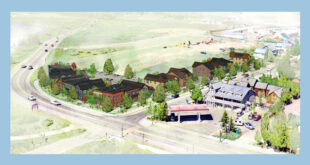Tax increase of $15 per $100,000 valuation
Mt. Crested Butte residents will be asked to consider a property tax increase this fall, along with two other issues, in order to improve the town’s currently bleak financial status.
The Town Council discussed the potential ballot issues along with the Five Year Financial Plan during a work session on Tuesday, June 16. The council ultimately made a motion to have three different questions on the ballot this November.
One question will ask voters to increase the town’s sales tax from 4 percent to 5 percent. Another question will ask voters to “de-Bruce” the town’s existing 5.4 rate capital mil levy. Revenues from this portion of the mil levy can be used only on capital improvements projects, not the general fund. Due to the Taxpayers Bill of Rights Amendment, the town can only draw the equivalent of a 3.09 mil levy.
“De-Brucing” refers to removing the financial restrictions imposed by TABOR, allowing the town to collect on the full mil rate and keep the money instead of returning it to taxpayers.
Town finance officer Karl Trujillo estimates that de-Brucing the mil levy would cost property owners $15 per $100,000 of assessed valuation each year.
The final question will ask voters to renew the town’s admissions tax—a 4 percent tax on admissions-related activities like lift ticket purchases and snowmobile rentals. The funds from this tax are used to market the area and support the Mountain Express bus service. The ballot question will also ask voters to remove the sunset clause on the admissions tax, which would keep the tax in perpetuity unless repealed by voters in a future ballot question.
The ballot questions are intended to help keep current town services in place and increase the town’s cash balance from $206,000 at the beginning of 2010, to $766,000 by 2014. Passage of the ballot issues would also allow the town to take on $2 million in bonds to tackle a backlog of road repairs.
The town has two financial plans based on the success or failure of the ballot issues. If the ballot issues are not passed, the town will base its annual budgets on Financial Plan B.
Under Plan B, Trujillo said, the town’s recreation department would be cut, two full-time employees would be cut, the town wouldn’t contribute funds to groom the recreation path in the winter, and the town would lose its lease for the Snowmass public parking lot.
Councilmember Mike Kube noted that the town’s cash reserve ended up being higher in Plan B than in Plan A. He said that might be confusing to voters, and questioned whether the town should spend a little extra money even if the ballot issues do not pass.
Mayor William Buck said keeping a higher cash balance under Plan B made some sense. “Then if things get worse, you still have the fund balance,” he said.
Councilmember Dave Clayton said he agreed with Kube. “Let’s add some money into road maintenance and other things so we end up with the same percentage of reserves [in both plans],” Clayton said.
Fitzpatrick said he and Trujillo would make some adjustments to Plan B and bring it back to the council.
The official ballot questions have not been formulated and will be considered by the council sometime in July.
 The Crested Butte News Serving the Gunnison Valley since 1999
The Crested Butte News Serving the Gunnison Valley since 1999


